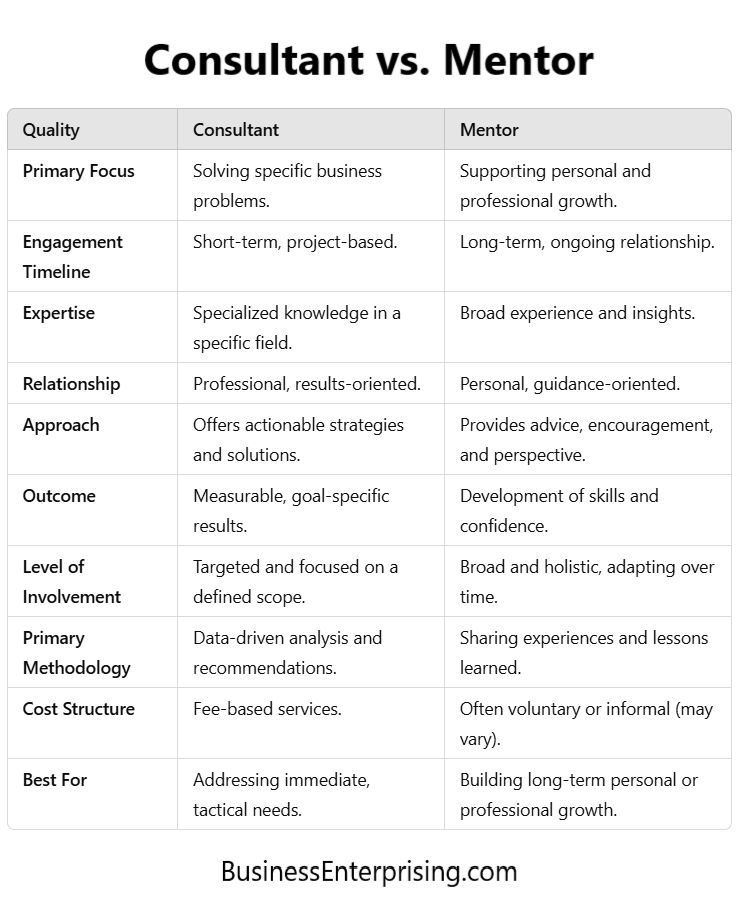 Understanding the difference between a Mentor and a Consultant is essential when seeking guidance for personal or business growth. Mentors focus on providing ongoing support, helping you grow your skills and confidence over time. Consultants, however, deliver specialized expertise to solve specific challenges or achieve targeted goals.
Understanding the difference between a Mentor and a Consultant is essential when seeking guidance for personal or business growth. Mentors focus on providing ongoing support, helping you grow your skills and confidence over time. Consultants, however, deliver specialized expertise to solve specific challenges or achieve targeted goals.
Both roles offer valuable insights, but their approaches are distinct. Mentors build relationships that evolve as your needs change, often focusing on long-term development. Conversely, consultants work within defined timelines, delivering actionable strategies to address immediate needs. Additionally, their involvement is usually project-based, making their impact more direct and measurable.
Choosing between a mentor and a consultant depends on your objectives. Therefore, identifying your goals helps you determine which role will offer the most value. By understanding how these roles differ, you can make informed decisions to support your growth effectively.
Defining Mentors and Consultants: Key Characteristics
Understanding the difference between a Mentor and a Consultant begins with recognizing their distinct roles and approaches. Mentors provide ongoing guidance focused on your personal and professional growth. Their advice is often based on experience and long-term relationships. Mentors help you build skills, expand perspectives, and develop confidence over time.
Consultants, on the other hand, focus on solving specific business challenges. Their expertise is often project-based, offering actionable solutions tailored to your needs. Consultants analyze problems, recommend strategies, and implement changes. While their involvement is usually shorter, their impact can be immediate and measurable.
Both roles guide you toward success, but their methods differ. Mentors nurture your development by offering advice and encouragement over time. Consultants provide specialized expertise to address targeted issues. Understanding these differences allows you to choose the right support for your goals.
The Nature of the Relationship: Ongoing Guidance vs. Project-Based Expertise
The difference between a Mentor and a Consultant becomes clear when you examine the nature of their relationships. A mentor-mentee relationship is typically long-term and focused on growth over time. Mentors provide ongoing guidance, helping you navigate challenges and opportunities throughout your career or business development.
Consultant-client engagements, however, are usually short-term and project-specific. Consultants are hired to address immediate needs, such as solving problems or optimizing processes. They focus on delivering results within a set timeframe. Once the project concludes, the relationship often ends, though some consultants may provide follow-up support.
Additionally, mentors often prioritize building a personal connection to better understand your goals and challenges. This allows them to offer tailored advice and encouragement. In contrast, consultants prioritize results, often relying on data-driven insights and specialized knowledge to meet defined objectives. Both relationships add value, but their dynamics and timelines differ significantly. Would you like help identifying which approach fits your current needs?
Focus Areas: Personal Growth vs. Problem-Solving
The difference between a Mentor and a Consultant lies in the focus of their guidance. Mentors prioritize your personal and professional growth. They help you build confidence, develop skills, and expand your perspective over time. Their role often involves nurturing your potential and providing advice tailored to your long-term aspirations.
Consultants, on the other hand, focus on solving specific business challenges. They offer expertise to address pressing issues such as improving processes, optimizing strategies, or meeting defined goals. Unlike mentors, consultants aim to deliver actionable solutions within a set timeframe. Their guidance is precise, practical, and oriented toward immediate results.
Additionally, mentors often foster a supportive relationship that evolves as you grow. Their advice typically spans broader areas of personal and career development. In contrast, consultants target measurable outcomes and use their expertise to achieve specific objectives. While both roles provide value, their focus areas differ significantly. Understanding these distinctions helps you make informed decisions about your support needs. Would you like further examples of how these roles can complement each other?
Level of Involvement: Broad Support vs. Targeted Solutions
The difference between a Mentor and a Consultant often lies in the level of involvement they bring to their roles. Mentors provide broad support, offering advice and encouragement tailored to your overall growth. Their focus is often on guiding you through challenges and helping you develop skills over time. This approach allows you to explore solutions while receiving ongoing feedback and guidance.
Consultants, however, focus on delivering specialized, actionable strategies. They work on specific problems or goals, often with a clear timeline and defined outcomes. Additionally, consultants provide expertise in areas where your business or team may lack knowledge. Their involvement is typically limited to addressing targeted challenges, leaving you with practical solutions you can implement.
While mentors prioritize fostering long-term development, consultants concentrate on solving immediate issues. However, both can complement each other in supporting your growth and success. Recognizing these differences allows you to choose the right kind of support based on your current needs and objectives. Would you like help exploring how these approaches could work together effectively?
When to Work with a Mentor vs. a Consultant
Knowing when to work with a mentor or a consultant depends on your goals and circumstances. If you seek long-term personal or professional growth, a mentor may be the right choice. Mentors offer guidance over time, helping you refine skills, develop leadership abilities, and navigate complex challenges. For example, if you’re stepping into a new leadership role, a mentor can provide insights and encouragement to build your confidence.
Consultants, on the other hand, are better suited for addressing specific problems or achieving defined outcomes. If you need expert advice to streamline operations or launch a new product, a consultant can provide targeted solutions. For instance, when expanding into a new market, a consultant’s specialized knowledge can help you develop an effective strategy quickly.
The difference between a Mentor and a Consultant lies in the type of support they provide. While mentors focus on your overall development, consultants deliver expertise to solve immediate issues. By understanding your objectives, you can determine which role best aligns with your needs. Would you like examples of how these roles can complement each other in certain situations?
Blending Both Approaches for Maximum Benefit
Blending both mentors and consultants can help you achieve well-rounded growth. Mentors provide long-term guidance, while consultants offer targeted solutions. By leveraging both, you can address immediate challenges while building lasting skills and confidence. This approach ensures your growth is both strategic and sustainable.
For example, you might work with a mentor to develop leadership abilities and gain insight into industry trends. At the same time, you can hire a consultant to refine your business processes or improve financial performance. While mentors support your overall development, consultants deliver actionable results that align with your immediate objectives. Together, they create a powerful framework for success.
Additionally, these roles can complement each other during major transitions. For instance, when scaling your business, a mentor can guide you through leadership challenges. Meanwhile, a consultant can help with operational strategies and resource management. Understanding the difference between a Mentor and a Consultant allows you to balance their strengths and maximize their impact. Would you like help creating a plan to incorporate both into your growth strategy?
Conclusion
Understanding the difference between a Mentor and a Consultant can help you choose the right support for your goals. Mentors focus on long-term growth, offering guidance and encouragement to help you develop personally and professionally. Consultants, however, deliver targeted expertise and solutions to address specific challenges.
By leveraging both roles, you can build a strong foundation for success while addressing immediate needs. Mentors help you see the bigger picture, while consultants provide the tools to achieve specific objectives. Additionally, using both approaches creates a balanced strategy that supports your growth in multiple areas.
Whether you’re building skills or solving problems, mentors and consultants can complement each other effectively. Therefore, consider how each role aligns with your current needs and long-term vision. Together, they can provide the support you need to achieve well-rounded success. Would you like assistance in determining how these roles can fit into your plans?



